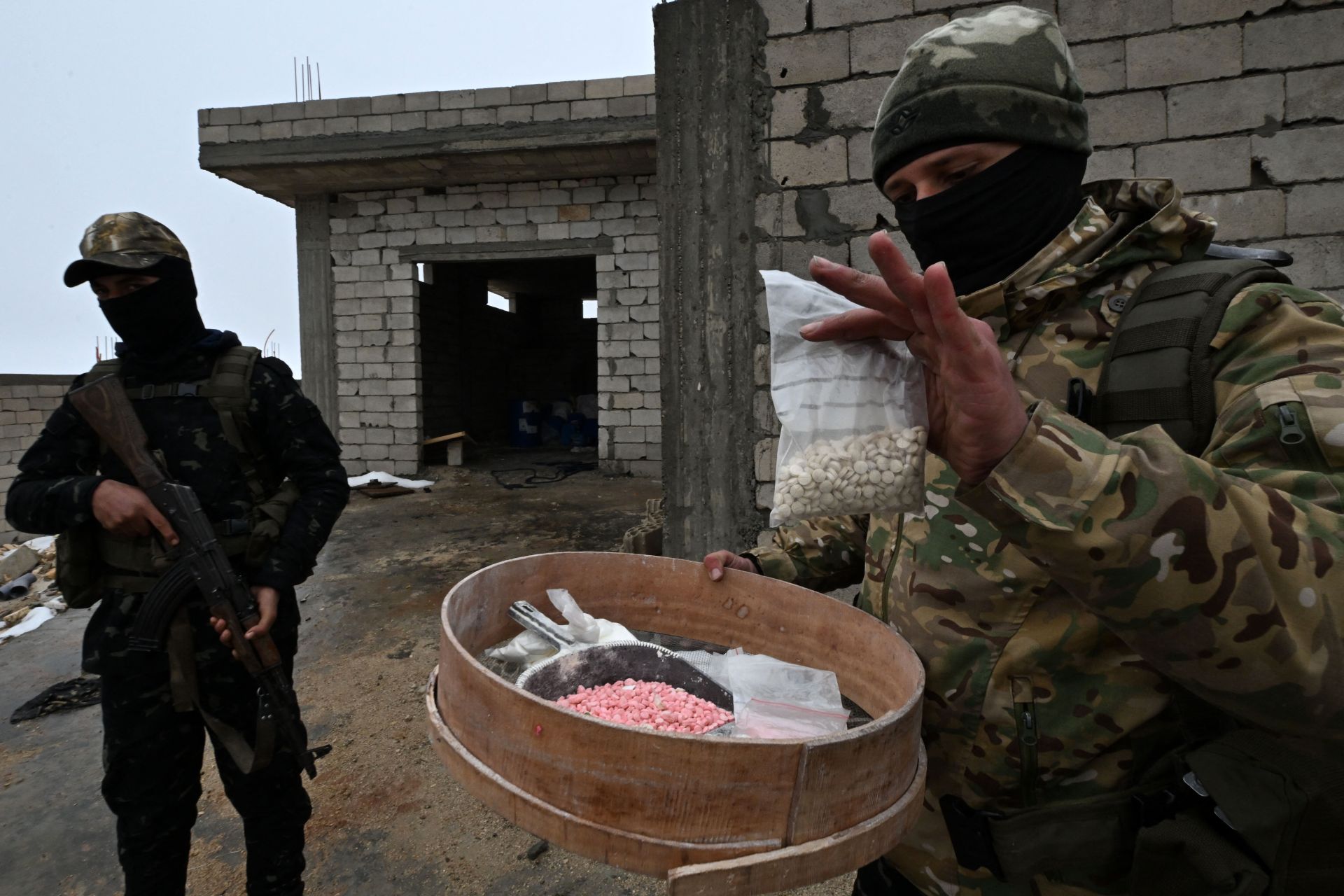- Home
- Middle East
- At the Lebanon-Syria Border, the New Syrian Authorities Are Hunting Down Traffickers Linked to Hezbollah

Members of the Syrian security forces gather bags of narcotics at defunct drug factory inside an abandoned building near the village of Hawik in the countryside of Al-Qusayr on February 12, 2025 ©LOUAI BESHARA / AFP
In a mountainous region between Syria and Lebanon, once controlled by smugglers linked to the Lebanese Hezbollah, a Syrian security official has a padlock broken on an abandoned building, revealing a newly discovered drug factory left to deteriorate.
In the Qousseir region, located in the Homs province in eastern Syria, the new authorities launched a campaign last week to combat smuggling at the porous Syria-Lebanon border.
They accuse the Lebanese Hezbollah, an ally of former President Bashar al-Assad, who was overthrown on December 8 after ruling Syria with an iron fist for 24 years, of sponsoring drug and arms trafficking networks.
"We are starting to comb through the factories used by Hezbollah and the former regime," said Commander Nadim Madkhaneh, speaking to AFP from the village of Hawik, a few hundred meters from the Lebanese border.
This region, bordering the Bekaa Valley, Hezbollah's stronghold in eastern Lebanon, is dotted with numerous smuggling routes that have been used for decades, as Syria refused to demarcate its 330 kilometers of border with Lebanon during the Assad years.
In April 2013, amidst a civil war that had erupted two years earlier due to violent repression of anti-government protests, Hezbollah officially displayed its military support for Bashar al-Assad, notably in Qousseir, which was then a major rebel stronghold.
A few weeks later, after fierce battles that displaced thousands of Syrians, Hezbollah and Assad's forces captured the area, and the Lebanese group gradually established headquarters, centers, tunnels, and arms depots.
"Dismantling"
"Under the former regime, this region was the economic artery for Hezbollah and drug and arms traffickers," explains Nadim Madkhaneh, in charge of border security.
In the raided building, AFP journalists saw sacks containing Captagon pills and equipment that, according to the official, was used to manufacture this amphetamine, produced on an industrial scale under Bashar al-Assad.
Abandoned plates in the kitchen suggest that the occupants left in a hurry.
According to Madkhaneh, Syrian forces recently clashed with armed men "loyal to Hezbollah and the former regime." Burned vehicles and damaged buildings along the roads in Hawik bear witness to the violence of the fighting.
In addition to "dismantling" drug factories, Madkhaneh states that his forces are also targeting the activities of arms and goods traffickers.
Syrian security forces are coordinating their efforts with the Lebanese army, which announced last week that it had strengthened its deployment at the northeast border.
In December, Hezbollah's leader, Naïm Qassem, acknowledged that Assad's downfall deprived his movement of military supplies via Syria.
"Colonized"
After Assad's overthrow and Hezbollah's withdrawal from its bases in Syria, the inhabitants of Qousseir began to return.
"I left here as a child, I don't know much about Qousseir," said Hassan Amer, 21, to AFP, as he repainted the walls of his recently renovated house in a neighborhood that is slowly coming back to life.
"We were displaced against our will... but we came back the day after the regime fell," he added, having spent nearly half of his life in Ersal, a Lebanese border region.
He doesn't hide his resentment towards Hezbollah, which "colonized Qousseir," turning its schools and public institutions into headquarters.
Mohammad Nasser, 22, returned in 2021 with his mother after Hezbollah called on residents to return home based on an authorization from the Syrian leaders of the time.
His father remained in Lebanon out of fear of being arrested.
"Next to us, there were pro-Hezbollah families living in the least damaged houses," the young man said.
Several residents told AFP that several Lebanese families, who had settled in the city since 2013, left when Assad was overthrown.
By Khaled Soubeih, AFP
Read more



Comments